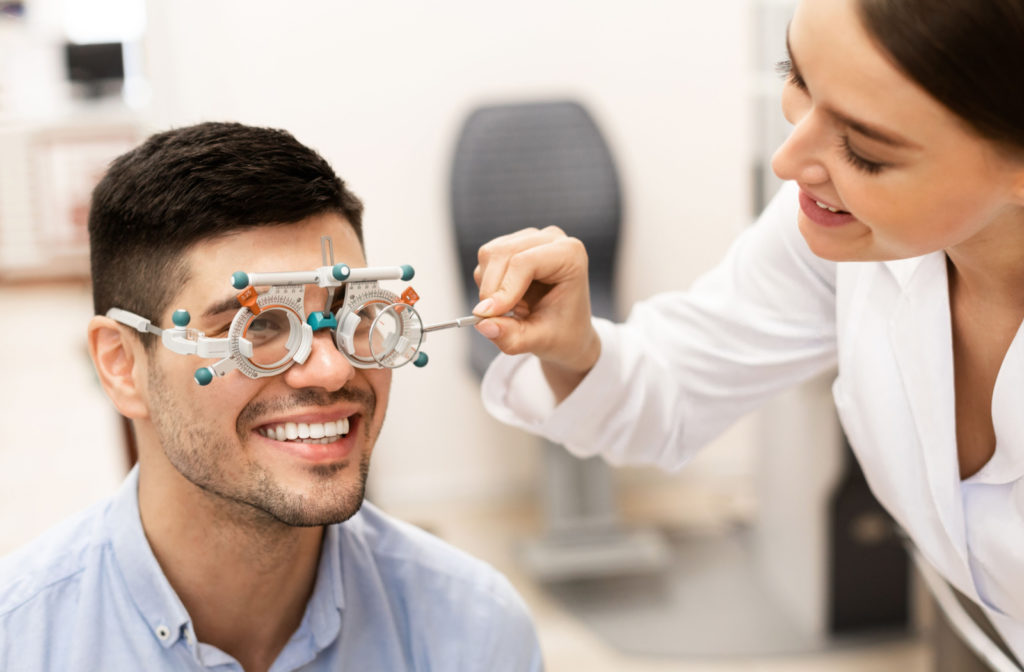Many people experience difficulty with night vision, making it challenging to navigate low-light conditions. Your eye doctor can determine the cause of vision impairment with a comprehensive eye exam, as many eye diseases and conditions can affect night vision.
The good news is that there are several simple yet effective ways to improve your night vision, such as maintaining a healthy diet, treating underlying eye conditions, and wearing glasses with an anti-reflective coating.
What Is Night Vision?
Night vision refers to how you see in low-light or dark conditions. It’s how different parts of your eyes work together to perceive objects and surroundings with minimal available light.
While our eyes naturally adjust to dimmer lighting, true night vision goes beyond that by enhancing visibility in extremely dark environments. When it’s dark outside, the pupils dilate or become larger to let more light in to reach the retina (the light-sensitive tissue at the back of the eye).
The retina has 2 kinds of photoreceptor cells: rods and cones. The cone cells provide color vision in brighter light, and the rod cells are sensitive in low light and only provide black-and-white vision.
The rod cells come on in low light conditions, but only a few cones work. This is why we see mostly black and white in the dark. When there is light, cones can come on and provide some color. When rods stop working due to natural aging or disease, it can affect your night vision.
Causes of Low Night Vision
Your night vision can change over time. Causes of decreased night vision can include the following:
- Age: As we age, the number of light-sensitive eye cells (photoreceptors or rods) essential for night vision diminishes.
- Small pupils: Pupils allow light to enter the eye, but the muscles that control pupil size weaken as we age, resulting in smaller pupils and less light entering the eye.
- More time to adjust: In older people, the eyes take more time to react to changes in light.
- Cataracts: The clear lens in the eye can become clouded over time, affecting how much light enters the eye and causing glare.
- Dry eye: Tear production decreases with age and can cause more glare and blurry vision at night.
- Glaucoma: Affects your peripheral and central vision. Common symptoms of glaucoma can include blurry vision, halos around lights, seeing glare, and reduced ability to read or drive.

Improve Your Night Vision
Night vision is valuable for driving at night, navigating low-light environments, or engaging in outdoor activities after sunset. It allows individuals to see objects, contours, and details more clearly, reducing the risk of accidents, increasing safety, and enhancing overall visual perception in darkness.
While some individuals naturally have better night vision, anyone can benefit from these tips to enhance their night vision.
Eat for Eye Health
It turns out that the food you eat can impact your vision, including your night vision. Incorporating certain foods into your diet can help support optimal eye health and function.
Get Regular Eye Exams
You may need a comprehensive eye exam every year, depending on your vision. This helps identify early signs of eye disease and keeps your eyeglasses prescription current.
Treat Underlying Conditions
Certain conditions, such as dry eyes and cataracts, can make nighttime driving difficult. Speak to your eye doctor if you’re a candidate for cataract surgery. When you treat these conditions, it can improve night vision.
Use a Flashlight
A small flashlight or a flashlight app on your smartphone can help you see better when walking in low-light areas or at night.
Turn on Lights
Add more light to brighten the inside and outside of your home when it’s dark, and keep blinds or curtains open during the day.
Maintain Your Eyeglasses
Keeping your prescription up-to-date and your lenses clean can help you see better at night. You can also ask your eye doctor for special nighttime driving glasses. Some specialized lenses even have anti-reflective coatings to reduce headlight glare when driving at night and improve visibility.
Keep Your Windshield & Headlights Clean
Even small amounts of dirt or dust can affect your vision on the road at night. Keep your windshield and headlights clean and in good working condition to make it easier to see when driving in low light.
Adapt Your Night Driving
Try out the following nighttime driving tips:
- Dim your dashboard lights
- Look at lane markings when oncoming traffic headlights blind you
- Use the night setting on your rearview mirror
- Stick to driving on familiar and well-lit streets
- Plan for extra time when driving at night
- Be extra careful when approaching intersections
- Avoid driving when you’re stressed or tired
Manage Eye Health & Protect Your Vision
Improving your night vision is possible when you incorporate these tips into your routine. Regular eye exams are even more crucial to help identify and manage underlying issues that don’t always show symptoms.
Book an appointment with Pacific EyeCare Optometry to test your vision and preserve your safety at night.



